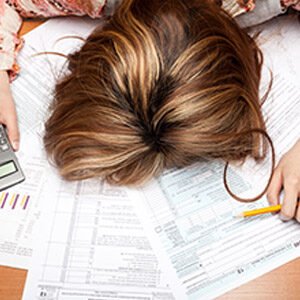What Debts Are Not Discharged In A Chapter 7 Discharge?
While most debts are discharged in a Chapter 7, there are a few non-dischargeable debts. These are….
- Debts obtained through fraud or due to committing fraud,
- Debts resulting from willful or malicious injury,
- Certain tax debts,
- Child support, and
- Alimony.
There are other debts that are non-dischargeable but they are less common. Please discusss these with us.
Should A Husband And Wife File Jointly Under Chapter 7?
A husband and wife don’t need to file jointly under a Chapter 7 bankruptcy. In fact, it isn’t encouraged for spouses to file jointly unless they both have debts that need to be discharged.
How Does Filing Under Chapter 7 Affect Lawsuits And Judgments That Have Already Been Entered Against The Debtor?
Filing under Chapter 7 will stop any lawsuits that are currently pending and will prevent anybody from being able to collect on a judgment. In Iowa, if you have a judgment that’s been entered against you, it’s automatically a lien on real estate. The lien on real estate can be removed through the bankruptcy process.
What Or Who Is A Trustee In A Chapter 7 Case, And What Do They Do?
A trustee in a Chapter 7 bankruptcy case is basically a referee who is making sure everybody – both debtors and creditors – are following the rules and going in the right direction.
The trustee’s job can also be to collect assets that are non-exempt, liquidate them, and use them to pay creditors, but this doesn’t usually happen.
At Marks Law Firm, we have a really good working relationship with our Chapter 7 trustees and can make things run very smoothly for our clients.
What Are The Debtors’ Responsibilities To The Trustee?
The debtors’ responsibilities to the trustee are very simple: They need to be open and honest.
There are certain disclosures when a person files bankruptcy and the debtor will need to get the trustee information. We always encourage the debtor to be as clear and concise as possible.
We help our clients with these disclosures and usually the debtor, other than at the meeting of creditors, never actually has to speak with the trustee.
What Happens If A Debtor Has No Property For The Trustee To Collect?
If a debtor has no property for the trustee to collect, their case gets classified as a no-asset case. Then, 60 days after the meeting of creditors, the case is closed and the debtor receives his or her discharge.
What Do Creditors With Mortgages Against The Debtor’s Property Do In A Chapter 7 Case?
Creditors with mortgages against the debtor’s property in a Chapter 7 case don’t do much. If the debtor wants to keep their house, the debtor keeps making payments on their mortgage. If the debtor is going to surrender or lose their house for another reason, the mortgage company may come in and ask for relief from the automatic stay and move forward with foreclosure.
What Do Unsecured Creditors Do In A Chapter 7 Case?
If the case is a no-asset case, meaning that there’s no property for the trustee to administer, unsecured creditors don’t do anything.
If it’s an asset case, meaning that the trustee finds some non-exempt property that needs to be administered, the creditors will be asked to file a document called a proof of claim. They then may receive a distribution in the bankruptcy case.
How Is A Debtor Notified If Their Discharge Has Been Granted?
A debtor is notified that their discharge has been granted by a letter sent from the clerk of court. We also notify the client as soon as the discharge is entered.
What Is The Role Of The Attorney For A Consumer Debtor In Chapter 7 Case?
At Marks Law Firm, our role is to do everything for you. This includes, but isn’t limited to…
- Preparing your petition, collecting information, and advising you how best to proceed
- Working with the clerk of court to file your petition,
- Working with the trustee office to make sure your case is concisely administered, and
- Making sure all the administrative matters are handled.
Filing for bankruptcy should be easy and can grant you the financial relief you both need and deserve in order to have a fresh start. For more information on Non-Dischargeable Debts In A Chapter 7, a free initial consultation is your next best step.
I Offer Free Phone Consultations
(515) 276-7211
